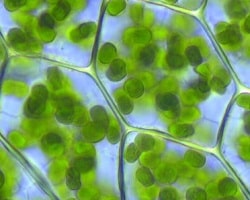Chlorophyll is an important part of a plant that enables photosynthesis and is said to have significant health benefits. However, some people claim to have frequent trips to the loo after taking chlorophyll. But is there truth behind it? Does chlorophyll make you poop?
Does Chlorophyll Make You Poop?
Yes, chlorophyll can make you poop. However, the stool-softening effects are very mild for most people.
What Is Chlorophyll?

Chlorophyll is the pigment that gives plants their green color, because they don’t absorb the green wavelengths of white light, with that particular light wavelength reflected from the plant, giving it its green color.
Chlorophyll is located in a plant’s chloroplasts, which are organelles in a plant’s cells and responsible for facilitating photosynthesis, producing oxygen, which the plant releases into the air. It’s also a key component in photosynthesis, which sustains plant life and produces oxygen for the entire planet.
In this process of photosynthesis, chlorophyll’s main role is to absorb light â specifically sunlight to gain energy. The energy absorbed from light is then transferred to two kinds of energy-storing molecules. In this way, the plant uses the stored energy to convert carbon dioxide and water into glucose, a type of sugar. Plants use glucose and nutrients taken from the soil to make new leaves and other plant parts.
Like mitochondria, chloroplasts and mitochondria function to generate metabolic energy, evolved by endosymbiosis, contain their own genetic systems, and replicate by division. While microscopic in size, chloroplasts like these play an important role in the planet’s health.
Chlorophyll is also found in green leafy vegetables, wheatgrass, green tea, potatoes, and some algae and herbs and is likewise found in supplements where it is often sourced from alfalfa and silkworm droppings.
Benefits Of Chlorophyll
Chlorophyll has several touted benefits, such as:
- Strengthens the immune system – Environmental health specialist Trista Best says that since chlorophyll is rich in antioxidants, it can act in therapeutic ways to benefit the body, especially the immune system. The antioxidants serve as anti-inflammatory agents inside the body, helping improve immune function and response from within.
- Can [potentially] slow cancer growth – Various animal studies found that natural chlorophyll reduced the risk of cancer cell growth in rodents, while a 2015 study found that chlorophyllin might help prevent and slow cancer growth.
- Benefits the blood – Chlorophyll is chemically similar to hemoglobin, a protein essential in building and improving the quality of red blood cells, which carry oxygen around the body. For example, studies suggest that wheatgrass juice, rich in chlorophyll, can significantly affect blood hemoglobin levels and helps cure anemia.
- Promotes detoxification – The most notable benefit of chlorophyll is its detoxifying properties. Studies have shown that chlorophyll promotes detoxification because of its ability to bind to heavy metals. It also aids in the removal of toxic substances and promotes healthy liver function, balances fluid levels, and reduces cases of constipation.
- Improves digestion – Natural chlorophyll is broken down in the gut during the digestive process to help improve digestion, and it does so by increasing the good bacteria in the digestive tract. Dietitian Lisa Samuels also notes chlorophyll’s antimicrobial properties, which helps gets rid of harmful bacteria while maintaining healthy ones.
- Promotes weight loss – Studies show chlorophyll supports metabolism and increases the likelihood of success with weight-loss efforts. A 2014 study from Lund University in Sweden found that chlorophyll supplements, coupled with a high-carbohydrate meal, increased levels of cholecystokinin, a gut hormone that helps digestion and reduces appetite, which in turn helped decrease hunger, and lowered the risk of hypoglycemia in overweight women.
- Heals and improves the skin – One pilot study involving a group of people with sun-damaged skin found that using topical chlorophyllin helped improve their condition over 8 weeks. It’s also been found to stimulate tissue growth, which plays a role in slowing down the skin aging process by stimulating anti-aging enzymes and encouraging nourished youthful skin.
Can Chlorophyll Make You Poop?
Does chlorophyll make you poop? â Yes, it can. Here’s how:
Taking chlorophyll supplements may trigger gastrointestinal effects, including diarrhea and urine/stool discoloration (usually a greenish hue) in some people or after taking large doses. It can also loosen stool and encourage bowel movements, although this is beneficial for people who are constipated, as it facilitates movement.
People have also reported experiencing stomach cramps alongside diarrhea. Others also claim their tongues turning black or yellowish. However, while these side effects are extremely uncomfortable, they are otherwise harmful and usually last only a day or two.
To avoid experiencing such symptoms, doctors recommend taking chlorophyll at lower doses (especially if you’re a first-time user) and gradually increasing it once you’ve built up a tolerance. Ask your doctor for help when increasing dosages.
Other Side Effects
Aside from increased bowel movements, chlorophyll is also known to cause the following side effects:
- Profuse sweating
- Nausea (This is a result of chlorophyll making its way through the digestive system)
- Vomiting
- Skin irritation (especially when applied topically)
While symptoms are generally harmless, should these persist longer, consult your doctor immediately.
Taking Chlorophyll Supplements
Chlorophyll supplements vary widely in strength and formulation. Some supplements come in drops that a person can add to water or another drink, while other brands come in capsule form.
The standard recommended dosages for chlorophyll capsules can range from 100 to 300 milligrams up to three times per day, while liquid chlorophyll supplements are taken by adding around 1 teaspoon (5 milliliters) of the supplement to a beverage of one’s choice. If the taste is unpleasant, try starting with a smaller amount and gradually increasing the dosage.
Chlorophyll supplements are generally safe and do not appear to have serious side effects. However, anyone who is pregnant or breastfeeding should speak to a doctor before taking a chlorophyll supplement.
Foods Rich In Chlorophyll
If you prefer getting chlorophyll through diets, most naturally green vegetables contain chlorophyll and are excellent additions. Ones that are particularly rich in chlorophyll and other nutrients include:
- Alfalfa
- Asparagus
- Barley grass
- Broccoli
- Chlorella
- Collard greens
- Green beans and peas
- Green cabbage
- Matcha green tea
- Mustard greens
- Parsley
- Spinach
- Spirulina
- Wheatgrass
Takeaway
Chlorophyll is an important part of a plant, responsible for light absorption to provide energy for photosynthesis. It also has promising health benefits like strengthening the immune system, boosting red blood cells, and healing the skin.
Side effects may occur now and then but are generally harmless. To avoid experiencing them, start taking small doses and gradually increase them once you’ve built immunity. If side effects persist, consult with your healthcare provider immediately.
Disclaimer: this article does not constitute or replace medical advice. If you have an emergency or a serious medical question, please contact a medical professional or call 911 immediately. To see our full medical disclaimer, visit our Terms of Use page.










